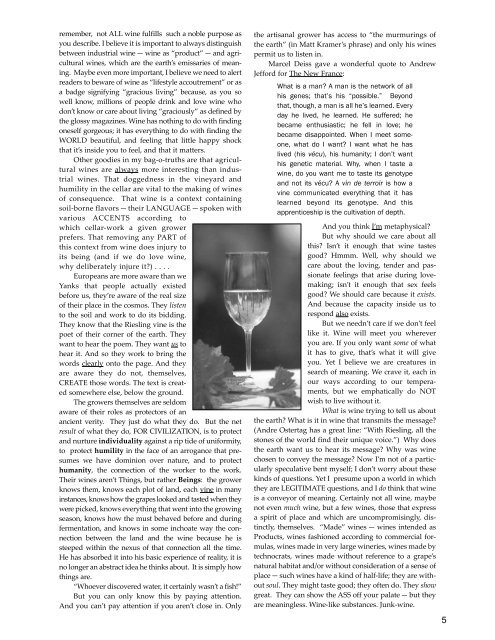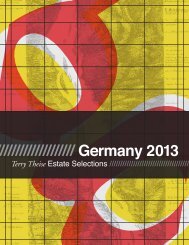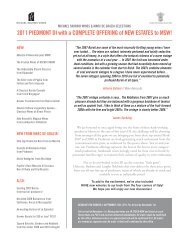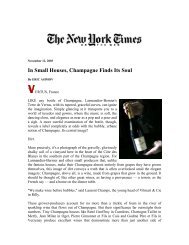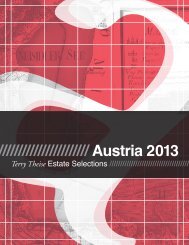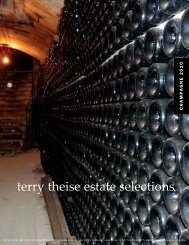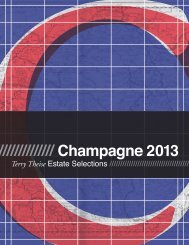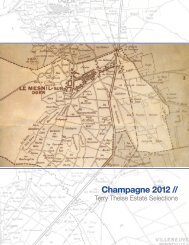German Catalog 2006 USE THIS ONE.qxp - Michael Skurnik Wines
German Catalog 2006 USE THIS ONE.qxp - Michael Skurnik Wines
German Catalog 2006 USE THIS ONE.qxp - Michael Skurnik Wines
You also want an ePaper? Increase the reach of your titles
YUMPU automatically turns print PDFs into web optimized ePapers that Google loves.
emember, not ALL wine fulfills such a noble purpose as<br />
you describe. I believe it is important to always distinguish<br />
between industrial wine — wine as “product” — and agricultural<br />
wines, which are the earth’s emissaries of meaning.<br />
Maybe even more important, I believe we need to alert<br />
readers to beware of wine as “lifestyle accoutrement” or as<br />
a badge signifying “gracious living” because, as you so<br />
well know, millions of people drink and love wine who<br />
don’t know or care about living “graciously” as defined by<br />
the glossy magazines. Wine has nothing to do with finding<br />
oneself gorgeous; it has everything to do with finding the<br />
WORLD beautiful, and feeling that little happy shock<br />
that it’s inside you to feel, and that it matters.<br />
Other goodies in my bag-o-truths are that agricultural<br />
wines are always more interesting than industrial<br />
wines. That doggedness in the vineyard and<br />
humility in the cellar are vital to the making of wines<br />
of consequence. That wine is a context containing<br />
soil-borne flavors — their LANGUAGE — spoken with<br />
various ACCENTS according to<br />
which cellar-work a given grower<br />
prefers. That removing any PART of<br />
this context from wine does injury to<br />
its being (and if we do love wine,<br />
why deliberately injure it?) . . . .<br />
Europeans are more aware than we<br />
Yanks that people actually existed<br />
before us, they’re aware of the real size<br />
of their place in the cosmos. They listen<br />
to the soil and work to do its bidding.<br />
They know that the Riesling vine is the<br />
poet of their corner of the earth. They<br />
want to hear the poem. They want us to<br />
hear it. And so they work to bring the<br />
words clearly onto the page. And they<br />
are aware they do not, themselves,<br />
CREATE those words. The text is created<br />
somewhere else, below the ground.<br />
The growers themselves are seldom<br />
aware of their roles as protectors of an<br />
ancient verity. They just do what they do. But the net<br />
result of what they do, FOR CIVILIZATION, is to protect<br />
and nurture individuality against a rip tide of uniformity,<br />
to protect humility in the face of an arrogance that presumes<br />
we have dominion over nature, and to protect<br />
humanity, the connection of the worker to the work.<br />
Their wines aren’t Things, but rather Beings: the grower<br />
knows them, knows each plot of land, each vine in many<br />
instances, knows how the grapes looked and tasted when they<br />
were picked, knows everything that went into the growing<br />
season, knows how the must behaved before and during<br />
fermentation, and knows in some inchoate way the connection<br />
between the land and the wine because he is<br />
steeped within the nexus of that connection all the time.<br />
He has absorbed it into his basic experience of reality, it is<br />
no longer an abstract idea he thinks about. It is simply how<br />
things are.<br />
“Whoever discovered water, it certainly wasn’t a fish!”<br />
But you can only know this by paying attention.<br />
And you can’t pay attention if you aren’t close in. Only<br />
the artisanal grower has access to “the murmurings of<br />
the earth” (in Matt Kramer’s phrase) and only his wines<br />
permit us to listen in.<br />
Marcel Deiss gave a wonderful quote to Andrew<br />
Jefford for The New France:<br />
What is a man? A man is the network of all<br />
his genes; that’s his “possible.” Beyond<br />
that, though, a man is all he’s learned. Every<br />
day he lived, he learned. He suffered; he<br />
became enthusiastic; he fell in love; he<br />
became disappointed. When I meet someone,<br />
what do I want? I want what he has<br />
lived (his vécu), his humanity; I don’t want<br />
his genetic material. Why, when I taste a<br />
wine, do you want me to taste its genotype<br />
and not its vécu? A vin de terroir is how a<br />
vine communicated everything that it has<br />
learned beyond its genotype. And this<br />
apprenticeship is the cultivation of depth.<br />
And you think I’m metaphysical?<br />
But why should we care about all<br />
this? Isn’t it enough that wine tastes<br />
good? Hmmm. Well, why should we<br />
care about the loving, tender and passionate<br />
feelings that arise during lovemaking;<br />
isn’t it enough that sex feels<br />
good? We should care because it exists.<br />
And because the capacity inside us to<br />
respond also exists.<br />
But we needn’t care if we don’t feel<br />
like it. Wine will meet you wherever<br />
you are. If you only want some of what<br />
it has to give, that’s what it will give<br />
you. Yet I believe we are creatures in<br />
search of meaning. We crave it, each in<br />
our ways according to our temperaments,<br />
but we emphatically do NOT<br />
wish to live without it.<br />
What is wine trying to tell us about<br />
the earth? What is it in wine that transmits the message?<br />
(Andre Ostertag has a great line: “With Riesling, all the<br />
stones of the world find their unique voice.”) Why does<br />
the earth want us to hear its message? Why was wine<br />
chosen to convey the message? Now I’m not of a particularly<br />
speculative bent myself; I don’t worry about these<br />
kinds of questions. Yet I presume upon a world in which<br />
they are LEGITIMATE questions, and I do think that wine<br />
is a conveyor of meaning. Certainly not all wine, maybe<br />
not even much wine, but a few wines, those that express<br />
a spirit of place and which are uncompromisingly, distinctly,<br />
themselves. “Made” wines — wines intended as<br />
Products, wines fashioned according to commercial formulas,<br />
wines made in very large wineries, wines made by<br />
technocrats, wines made without reference to a grape’s<br />
natural habitat and/or without consideration of a sense of<br />
place — such wines have a kind of half-life; they are without<br />
soul. They might taste good; they often do. They show<br />
great. They can show the ASS off your palate — but they<br />
are meaningless. Wine-like substances. Junk-wine.<br />
5


